Unit3 Topic1What's your hobby Section B课件+音频(共30张ppt)2023-2024学年仁爱版八年级英语上册
文档属性
| 名称 | Unit3 Topic1What's your hobby Section B课件+音频(共30张ppt)2023-2024学年仁爱版八年级英语上册 |
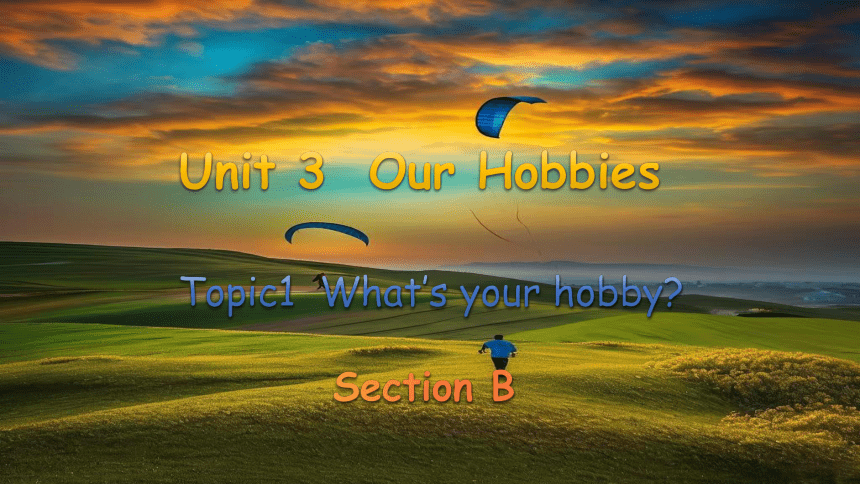
|
|
| 格式 | pptx | ||
| 文件大小 | 232.5MB | ||
| 资源类型 | 教案 | ||
| 版本资源 | 仁爱科普版 | ||
| 科目 | 英语 | ||
| 更新时间 | 2023-10-27 09:43:19 | ||
图片预览

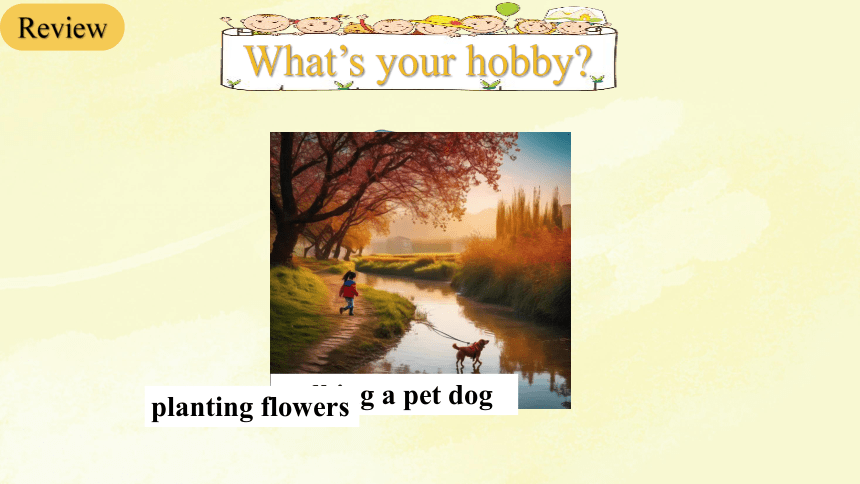
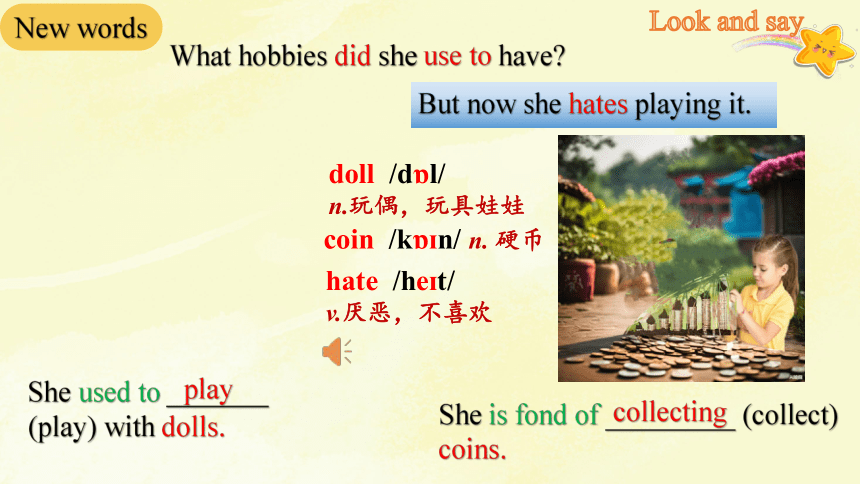
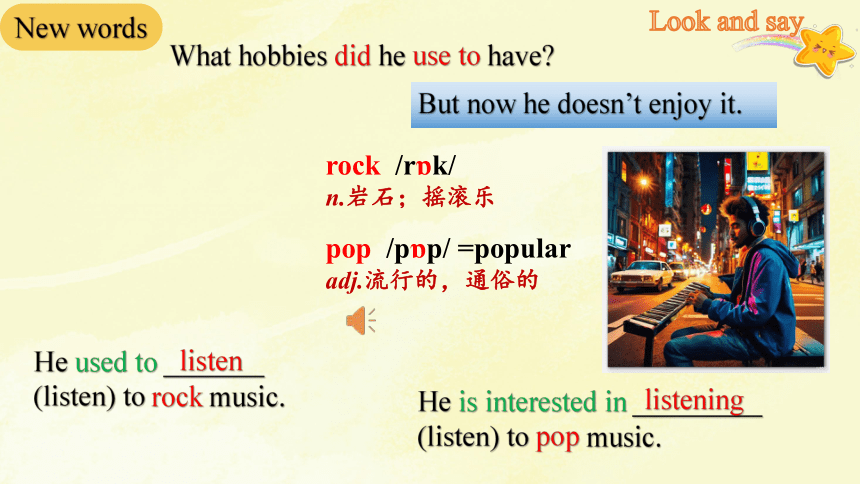
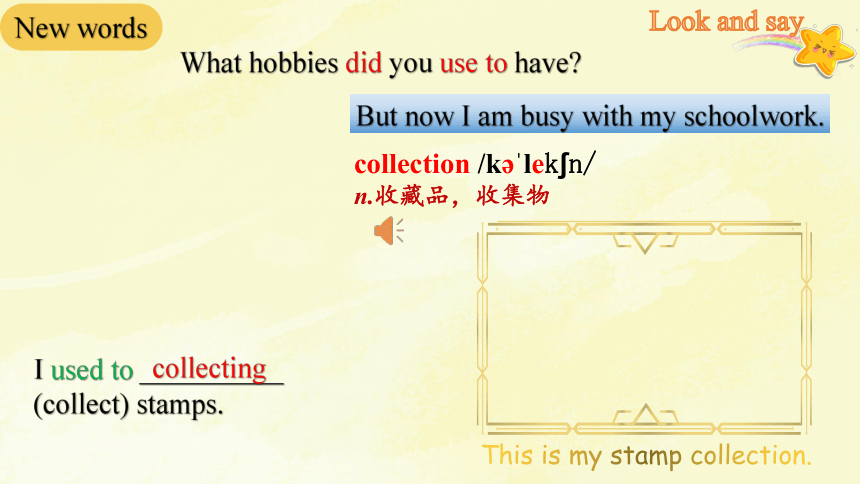

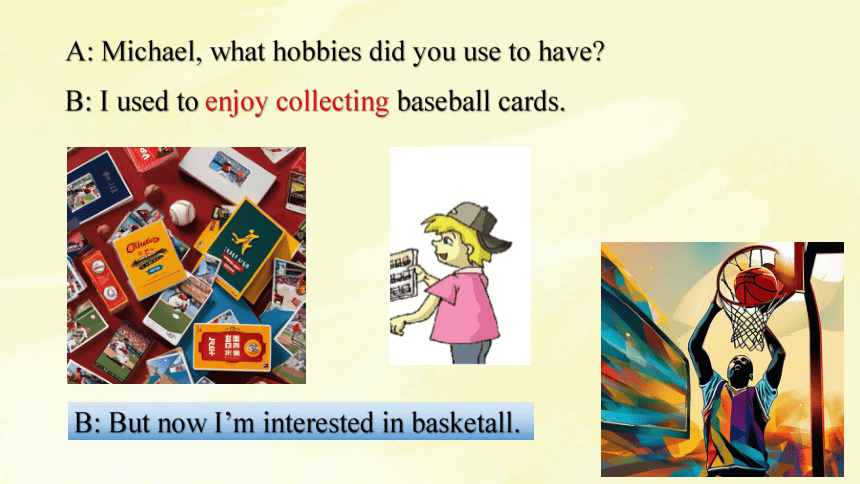
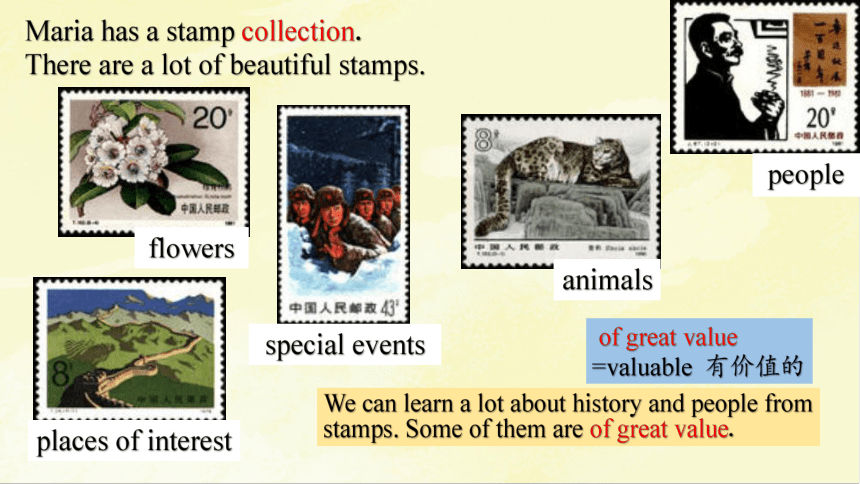
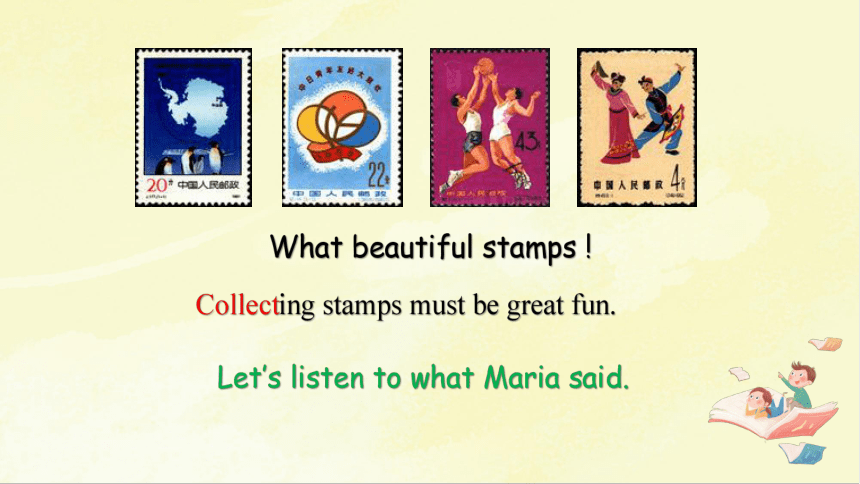
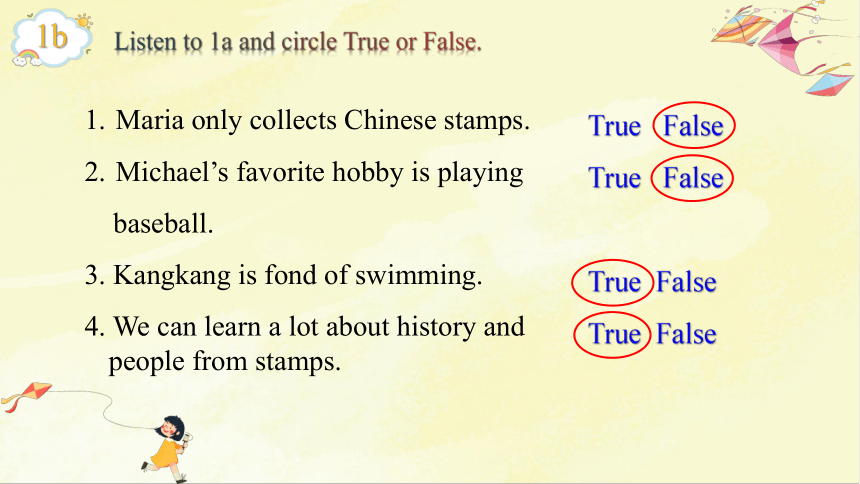
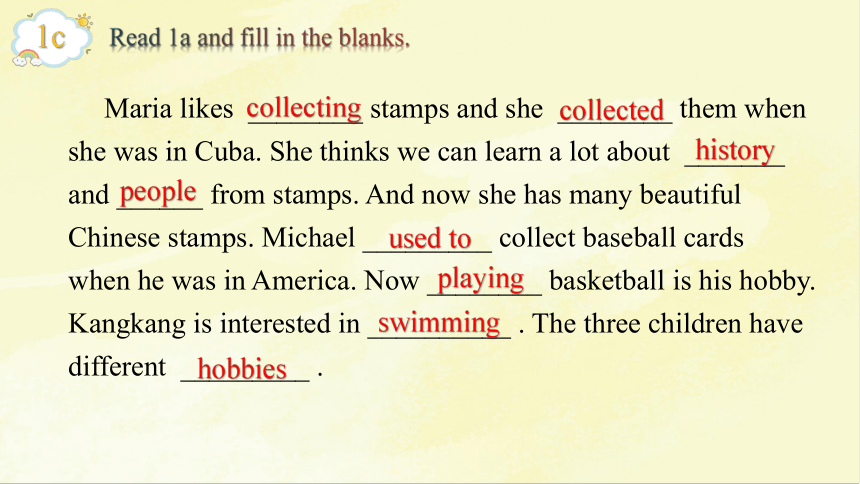
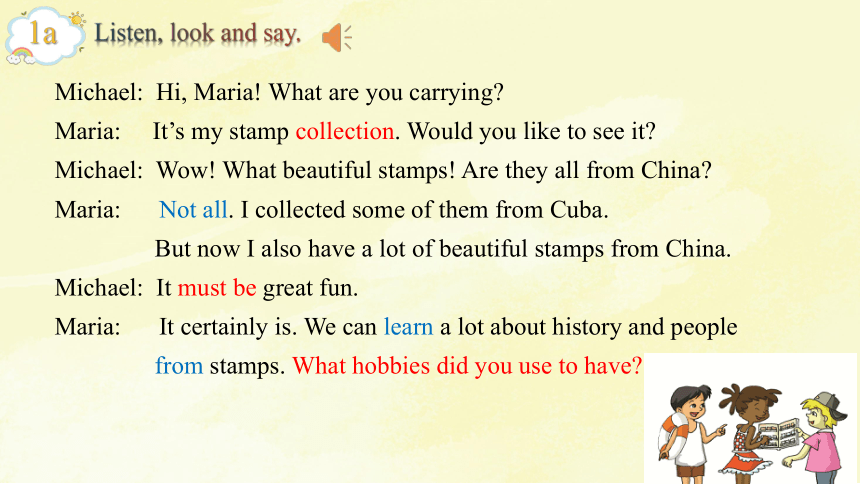
文档简介
Unit 3 Our Hobbies
Topic1 What’s your hobby?
Section B
What’s your hobby?
climbing a rock/
rock-climb
reading books
drawing pictures
Review
reciting poems
walking a pet dog
planting flowers
What hobbies did she use to have?
She used to _______
(play) with dolls.
Look and say
play
But now she hates playing it.
She is fond of _________ (collect) coins.
collecting
doll /d?l/
n.玩偶,玩具娃娃
hate /he?t/
v.厌恶,不喜欢
coin /k??n/ n. 硬币
New words
What hobbies did he use to have?
He used to _______
(listen) to rock music.
Look and say
listen
But now he doesn’t enjoy it.
He is interested in _________ (listen) to pop music.
listening
pop /p?p/ =popular
adj.流行的,通俗的
New words
rock /r?k/
n.岩石;摇滚乐
What hobbies did you use to have?
I used to __________
(collect) stamps.
Look and say
collecting
But now I am busy with my schoolwork.
New words
collection /k??lek?n/
n.收藏品,收集物
This is my stamp collection.
Talk about your hobbies in groups with the following expressions.
I used to
like/love /enjoy...
but now I
hate it.
don’t like/enjoy/love it.
I
am fond of /
interested in …
keep pets listen to music watch TV
play computer games go shopping play soccer
3
Example:
A: What hobbies did you use to have?
B: I used to enjoy pop music, but now I don’t like it.
I love playing sports.
A: Michael, what hobbies did you use to have?
B: I used to enjoy collecting baseball cards.
B: But now I’m interested in basketall.
flowers
people
places of interest
animals
special events
We can learn a lot about history and people from stamps. Some of them are of great value.
Maria has a stamp collection.
There are a lot of beautiful stamps.
of great value
=valuable 有价值的
What beautiful stamps !
Collecting stamps must be great fun.
Let’s listen to what Maria said.
Listen to 1a and circle True or False.
Maria only collects Chinese stamps.
Michael’s favorite hobby is playing
baseball.
3. Kangkang is fond of swimming.
4. We can learn a lot about history and people from stamps.
True False
True False
True False
True False
1b
Read 1a and fill in the blanks.
Maria likes ________ stamps and she ________ them when she was in Cuba. She thinks we can learn a lot about _______ and ______ from stamps. And now she has many beautiful Chinese stamps. Michael _________ collect baseball cards when he was in America. Now ________ basketball is his hobby. Kangkang is interested in __________ . The three children have different _________ .
collecting
collected
people
history
used to
playing
swimming
hobbies
1c
Michael: Hi, Maria! What are you carrying?
Maria: It’s my stamp collection. Would you like to see it?
Michael: Wow! What beautiful stamps! Are they all from China?
Maria: Not all. I collected some of them from Cuba.
But now I also have a lot of beautiful stamps from China.
Michael: It must be great fun.
Maria: It certainly is. We can learn a lot about history and people
from stamps. What hobbies did you use to have?
1a
Listen, look and say.
Michael: I used to collect baseball cards.
But now I’m interested in basketball.
(Here comes Kangkang.)
Kangkang: Hi, Maria! Hi, Michael! What are you looking at?
Michael: Hi, Kangkang! We are looking at Maria’s stamp collection.
Where are you going?
Kangkang: I’m going swimming. It’s my favorite hobby.
1a
Listen, look and say.
1. It must be great fun. 它(集邮)一定很有趣。
考点:
句中的must用来表示对目前的状态的一种非常肯定的推测或看法。此时常译为“必定,一定”;如果表示否定的猜测,则用can’t“不可能”;如果可能性不太大,说话人不能确定,常常用may“可能”。
eg. The light is on. He must be at home.
It can’t be Tom. He has gone to Shanghai.
练习:1.那个女孩一定是个老师。
That girl ____________ a teacher.
2.她可能是我们的老师。
She ____________ our teacher.
=Maybe she is our teacher.
Language points
must be
may be
2. I used to collect baseball cards. 我过去常常收集棒球卡。
考点:
(1)used to do sth.表示“过去常常做某事”,现在不做了,强调过去和现在的对比,to后加动词的原形。
eg. He used to go there by bus.
(2)used to do 的否定句形式:
主语+usedn’t to do /didn’t use to do.
(3)used to do的疑问句形式及其回答:
—Used+主语+to do sth.? —Yes, sb. used to./No, sb. usedn’t.
—Did+主语+use to do sth.? —Yes, sb. did./No, sb. didn’t.
Language points
闯关练习:
1.He used to get up early.
否定句:He ____________________ to get up early.
一般疑问句:_____ he ____ to get up early?
/ _____ he ____ get up early?
对划线部分提问:_____ _____ he ______ to do ?
2. My brother used to go swimming in the sea.
否定句:My brother ___________________ to go swimming in the sea.
一般疑问句:______ your brother ___________ swimming in the sea ?
回答:Yes, _______ . No, _________ .
一般疑问句:_____ your brother ______ swimming in the sea?
回答: Yes, _________ . No, ___________ .
didn’t use / usedn’t
Did use
Used to
What did use
didn’t use / usedn’t
Did
use to go
he did
he didn’t
Used
to go
he used
he usedn’t
Listen to the conversation and check the collections you hear.
telephone cards
model planes
dolls
photos of famous stars
stamps
coins
★
★
★
★
2
What do you love collecting? Why?
I love collecting coins, because I want to have a lot of money.
Pair work
Talk about your collections with your friends.
What do you love collecting? Why?
I love collecting stamps, because I can learn a lot about history and people from stamps. Besides, some of them are of great value.
Pair work
Talk about your collections with your friends.
Find out these phrases from the text.
stamp collection
must be
learn a lot about...from...
used to do sth.
some of them
1.邮票收集
2.必定,必然
3.从......学到很多关于......
4.过去常常做某事
5.他们中的一些
6.飞机模型
7.养宠物
8.著名明星的照片
9.康康来了。
model planes
keep pets
photos of famous stars
Here comes Kangkang.
Make a survey about hobbies in groups.
Complete the table and then report it to the class.
Name
Hobby
In the past
Now
Task
Xiao Wei likes …
But he used to … one year ago.
…
Report like this :
Read the following words and pay attention to the sounds of the underlined parts. Find the rules and add more words to each group .
/s/: stamps comics desks
/z/: stones dolls coins
/ts/: pets kites sports
/dz/: friends beds cards
4a
Listen and pay attention to the stress. Then read after the taps and imitate.
’hobbies ’certainly ’favorite ’interested
2. be ’fond of ’listen to ’music ’fly ’kites
’model ’planes
3. I ’didn’t use to ’keep ’pets, but ’now ’I love it.
4. I ’used to ’enjoy ’swimming, but ’now I ’don’t like it.
Stress occurs in words, phrases and sentences.
4b
Do the exercises !
Choose the best answer.
I used to ____ English Weekly, but now I prefer Ren’ai English Post.
A. liked B. likes C. liking D. like
2. Attention! ___ too much must be bad for our eyes.
A. Watch TV B. Watches TV
C. Watching TV D. Watched TV
3. My father likes collecting stamps. He says some stamps are of great ________ .
A. value B. price C. money D. number
( )4. Langlang is a great pianist. He _______ great interest in piano when he was very young.
A. shared B. hated C. showed D. played
( )5. Wang Yanbo’s mother is fond of _______.
A. cook B. cooker C. cooking D. cooked
( )6. Why _______ go out for a walk after supper?
A. don’t B. didn’t C. not D. doesn’t
( )7. Hobbies can _______ us happiness, friendship and knowledge, so we should have hobbies.
A. get B. take C. took D. bring
( )8. —What’s your hobby? —I _______ listen to music, but now I enjoy dancing.
A. am used to B. used to C. am used D. use to
C
C
C
D
B
( )9. I _______ draw, but now I am fond of it.
A. wasn’t use to B. didn’t use to C. am not use to D. don’t use to
( )10. —Would you mind _______? —Not at all.
A. provide help for us B. provide us with help
C. providing help for us D. providing us for help
( )11. His mother taught him _______ and read.
A. write B. writing C. to write D. writes
( )12. —What’s your hobby, please? —I _______ dancing.
A. am fond of B. enjoy C. prefer D. A, B and C
( )13. —_______ Li Lei _______ play computer games? —No, he _______.
A. Did; use to; didn’t B. Did; used to; didn’t
C. Does; use to; doesn’t D. Does; used to; doesn’t
B
C
provide sb. with sth.
=provide sth. for sb.
C
D
A
summary
I can say:
I used to …
I didn’t use to …/ I usedn’t to …
Did you use to … ? /
Used you to … ?
I know more about collections.
Homework
1. Read 1a.
2. Recite the new words and expressions.
3. Finish Section B in your workbook.
4. Preview Section C.
Thank you!
Topic1 What’s your hobby?
Section B
What’s your hobby?
climbing a rock/
rock-climb
reading books
drawing pictures
Review
reciting poems
walking a pet dog
planting flowers
What hobbies did she use to have?
She used to _______
(play) with dolls.
Look and say
play
But now she hates playing it.
She is fond of _________ (collect) coins.
collecting
doll /d?l/
n.玩偶,玩具娃娃
hate /he?t/
v.厌恶,不喜欢
coin /k??n/ n. 硬币
New words
What hobbies did he use to have?
He used to _______
(listen) to rock music.
Look and say
listen
But now he doesn’t enjoy it.
He is interested in _________ (listen) to pop music.
listening
pop /p?p/ =popular
adj.流行的,通俗的
New words
rock /r?k/
n.岩石;摇滚乐
What hobbies did you use to have?
I used to __________
(collect) stamps.
Look and say
collecting
But now I am busy with my schoolwork.
New words
collection /k??lek?n/
n.收藏品,收集物
This is my stamp collection.
Talk about your hobbies in groups with the following expressions.
I used to
like/love /enjoy...
but now I
hate it.
don’t like/enjoy/love it.
I
am fond of /
interested in …
keep pets listen to music watch TV
play computer games go shopping play soccer
3
Example:
A: What hobbies did you use to have?
B: I used to enjoy pop music, but now I don’t like it.
I love playing sports.
A: Michael, what hobbies did you use to have?
B: I used to enjoy collecting baseball cards.
B: But now I’m interested in basketall.
flowers
people
places of interest
animals
special events
We can learn a lot about history and people from stamps. Some of them are of great value.
Maria has a stamp collection.
There are a lot of beautiful stamps.
of great value
=valuable 有价值的
What beautiful stamps !
Collecting stamps must be great fun.
Let’s listen to what Maria said.
Listen to 1a and circle True or False.
Maria only collects Chinese stamps.
Michael’s favorite hobby is playing
baseball.
3. Kangkang is fond of swimming.
4. We can learn a lot about history and people from stamps.
True False
True False
True False
True False
1b
Read 1a and fill in the blanks.
Maria likes ________ stamps and she ________ them when she was in Cuba. She thinks we can learn a lot about _______ and ______ from stamps. And now she has many beautiful Chinese stamps. Michael _________ collect baseball cards when he was in America. Now ________ basketball is his hobby. Kangkang is interested in __________ . The three children have different _________ .
collecting
collected
people
history
used to
playing
swimming
hobbies
1c
Michael: Hi, Maria! What are you carrying?
Maria: It’s my stamp collection. Would you like to see it?
Michael: Wow! What beautiful stamps! Are they all from China?
Maria: Not all. I collected some of them from Cuba.
But now I also have a lot of beautiful stamps from China.
Michael: It must be great fun.
Maria: It certainly is. We can learn a lot about history and people
from stamps. What hobbies did you use to have?
1a
Listen, look and say.
Michael: I used to collect baseball cards.
But now I’m interested in basketball.
(Here comes Kangkang.)
Kangkang: Hi, Maria! Hi, Michael! What are you looking at?
Michael: Hi, Kangkang! We are looking at Maria’s stamp collection.
Where are you going?
Kangkang: I’m going swimming. It’s my favorite hobby.
1a
Listen, look and say.
1. It must be great fun. 它(集邮)一定很有趣。
考点:
句中的must用来表示对目前的状态的一种非常肯定的推测或看法。此时常译为“必定,一定”;如果表示否定的猜测,则用can’t“不可能”;如果可能性不太大,说话人不能确定,常常用may“可能”。
eg. The light is on. He must be at home.
It can’t be Tom. He has gone to Shanghai.
练习:1.那个女孩一定是个老师。
That girl ____________ a teacher.
2.她可能是我们的老师。
She ____________ our teacher.
=Maybe she is our teacher.
Language points
must be
may be
2. I used to collect baseball cards. 我过去常常收集棒球卡。
考点:
(1)used to do sth.表示“过去常常做某事”,现在不做了,强调过去和现在的对比,to后加动词的原形。
eg. He used to go there by bus.
(2)used to do 的否定句形式:
主语+usedn’t to do /didn’t use to do.
(3)used to do的疑问句形式及其回答:
—Used+主语+to do sth.? —Yes, sb. used to./No, sb. usedn’t.
—Did+主语+use to do sth.? —Yes, sb. did./No, sb. didn’t.
Language points
闯关练习:
1.He used to get up early.
否定句:He ____________________ to get up early.
一般疑问句:_____ he ____ to get up early?
/ _____ he ____ get up early?
对划线部分提问:_____ _____ he ______ to do ?
2. My brother used to go swimming in the sea.
否定句:My brother ___________________ to go swimming in the sea.
一般疑问句:______ your brother ___________ swimming in the sea ?
回答:Yes, _______ . No, _________ .
一般疑问句:_____ your brother ______ swimming in the sea?
回答: Yes, _________ . No, ___________ .
didn’t use / usedn’t
Did use
Used to
What did use
didn’t use / usedn’t
Did
use to go
he did
he didn’t
Used
to go
he used
he usedn’t
Listen to the conversation and check the collections you hear.
telephone cards
model planes
dolls
photos of famous stars
stamps
coins
★
★
★
★
2
What do you love collecting? Why?
I love collecting coins, because I want to have a lot of money.
Pair work
Talk about your collections with your friends.
What do you love collecting? Why?
I love collecting stamps, because I can learn a lot about history and people from stamps. Besides, some of them are of great value.
Pair work
Talk about your collections with your friends.
Find out these phrases from the text.
stamp collection
must be
learn a lot about...from...
used to do sth.
some of them
1.邮票收集
2.必定,必然
3.从......学到很多关于......
4.过去常常做某事
5.他们中的一些
6.飞机模型
7.养宠物
8.著名明星的照片
9.康康来了。
model planes
keep pets
photos of famous stars
Here comes Kangkang.
Make a survey about hobbies in groups.
Complete the table and then report it to the class.
Name
Hobby
In the past
Now
Task
Xiao Wei likes …
But he used to … one year ago.
…
Report like this :
Read the following words and pay attention to the sounds of the underlined parts. Find the rules and add more words to each group .
/s/: stamps comics desks
/z/: stones dolls coins
/ts/: pets kites sports
/dz/: friends beds cards
4a
Listen and pay attention to the stress. Then read after the taps and imitate.
’hobbies ’certainly ’favorite ’interested
2. be ’fond of ’listen to ’music ’fly ’kites
’model ’planes
3. I ’didn’t use to ’keep ’pets, but ’now ’I love it.
4. I ’used to ’enjoy ’swimming, but ’now I ’don’t like it.
Stress occurs in words, phrases and sentences.
4b
Do the exercises !
Choose the best answer.
I used to ____ English Weekly, but now I prefer Ren’ai English Post.
A. liked B. likes C. liking D. like
2. Attention! ___ too much must be bad for our eyes.
A. Watch TV B. Watches TV
C. Watching TV D. Watched TV
3. My father likes collecting stamps. He says some stamps are of great ________ .
A. value B. price C. money D. number
( )4. Langlang is a great pianist. He _______ great interest in piano when he was very young.
A. shared B. hated C. showed D. played
( )5. Wang Yanbo’s mother is fond of _______.
A. cook B. cooker C. cooking D. cooked
( )6. Why _______ go out for a walk after supper?
A. don’t B. didn’t C. not D. doesn’t
( )7. Hobbies can _______ us happiness, friendship and knowledge, so we should have hobbies.
A. get B. take C. took D. bring
( )8. —What’s your hobby? —I _______ listen to music, but now I enjoy dancing.
A. am used to B. used to C. am used D. use to
C
C
C
D
B
( )9. I _______ draw, but now I am fond of it.
A. wasn’t use to B. didn’t use to C. am not use to D. don’t use to
( )10. —Would you mind _______? —Not at all.
A. provide help for us B. provide us with help
C. providing help for us D. providing us for help
( )11. His mother taught him _______ and read.
A. write B. writing C. to write D. writes
( )12. —What’s your hobby, please? —I _______ dancing.
A. am fond of B. enjoy C. prefer D. A, B and C
( )13. —_______ Li Lei _______ play computer games? —No, he _______.
A. Did; use to; didn’t B. Did; used to; didn’t
C. Does; use to; doesn’t D. Does; used to; doesn’t
B
C
provide sb. with sth.
=provide sth. for sb.
C
D
A
summary
I can say:
I used to …
I didn’t use to …/ I usedn’t to …
Did you use to … ? /
Used you to … ?
I know more about collections.
Homework
1. Read 1a.
2. Recite the new words and expressions.
3. Finish Section B in your workbook.
4. Preview Section C.
Thank you!
同课章节目录
- Unit 1 Playing Sports
- Topic 1 I'm going to play basketball.
- Topic 2 I'll kick you the ball again.
- Topic 3 The school sports meet is coming.
- Unit 2 Keeping Healthy
- Topic 1 You should brush your teeth twice a day.
- Topic 2 I must ask him to give up smoking.
- Topic 3 Must we exercise to prevent the flu?
- Unit 3 Our Hobbies
- Topic 1 What's your hobby?
- Topic 2 What sweet music!
- Topic 3 What were you doing at this time yesterday
- Unit 4 Our World
- Topic 1 What's the strongest animal on the farm?
- Topic 2 How can we protect ourselves from the eart
- Topic 3 The Internet makes the world smaller.
